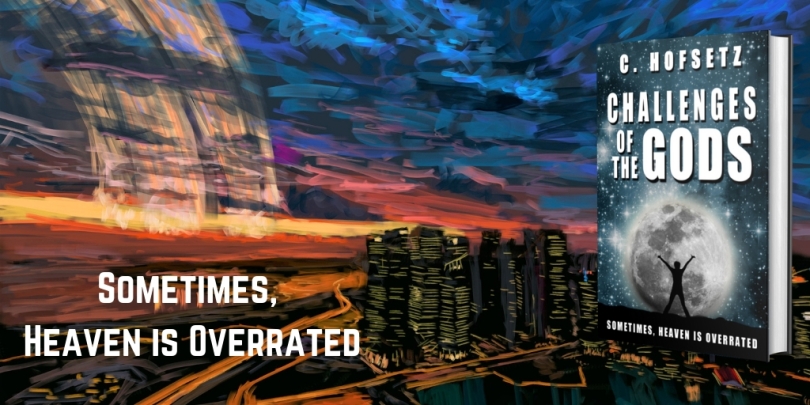If you’ve been reading my blog, you know I have no idea what I’m doing. The first draft of my novel probably made me lose a few friends, and since then I’m trying to improve it. It’s an ongoing backwards journey of fixing my book after I wrote it.
Lately I’ve been going through the following steps:
- My novel is awesome!
- Someone points out one problem that I had no idea was a problem in the first place.
- I hate the guts of that someone.
- Realization kicks in.
- The problem is everywhere!
- My book sucks.
- I spend a long time fixing said problem.
- Go back to 1.
Forgetting stuff is my specialty, but my memory is pretty good when something unexpected and unpleasant happens. As a result, I almost always remember when I learned something new about writing that impacts my novel.
You may be surprised that I didn’t know that “show, don’t tell” was a thing, but as far as writing was concerned I’m not the sharpest knife in the shed (sorry for the obvious joke).
Actually, it’s better if I show you.
if you like my writing style, please check my debut Science Fiction and Fantasy novel Challenges of the Gods. It’s getting great reviews!
The End of The Innocence
It all started when Galileo, one of my cats, was trying to have a nap on top of my laptop. I was worried that he’d change chapter 1, inadvertently making it better, as I was reading the feedback from one of my beta readers.
Her comment was a cryptic word that made no sense to me:
“Telly.”
Yes, telly. I reread the paragraph several times and I couldn’t find anything that could imply “television”, or “show”, or something related to TV. Moving on, I decided that I’d worry about it and Galileo afterwards. But a few paragraphs later, and after breaking Galileo’s heart by moving him away, there was another odd comment, this time with one extra word:
“Too telly.”
My writing was not only telly–whatever it meant–but it was too much like that. Okay, this was starting to look like a real problem. I clicked on the start button and launched my web browser, looking for salvation. But Google was no help at all. I didn’t even know we had a telly monster.

On the other hand, telly is more common in England, so maybe something similar happened on Dr. Who, or on the I.T. Crowd.
As I looked away from the red-violet monster, staring at the late afternoon sun of a lazy Saturday night, realization hit me, and I was shocked. my chest hurt, I dropped to my knees, fell on the floor and curled into a ball, crying.

Show; Don’t Tell!
It turns out that show, don’t tell is the number one rule of writing. Seriously, how often you do stuff without knowing the number one rule of it? It’s like grabbing a gun and looking at its muzzle while pressing its trigger to see if it’s loaded.
The idea is to describe what’s happening instead of just telling it. This works better in movies and TV (yay, I was not too far off)–for obvious reasons. For instance, which one of the scenes below is more remarkable?
The picture on the left where my daughter tells us that the house is on fire is too abstract, and since she’s smiling you may even think it’s a joke or a metaphor. But the picture on the right is clear, unmistakable and memorable: shit’s on fire, literally, and the girl seems happy for some odd reason.
Ok, I get it. So should I go ahead and show everything?
Writing that Shows Everything
Rather than saying she was upset, you say she frowned. She wasn’t happy, she smiled. And suddenly your characters are frowning every time, smiling too much, and narrowing their eyes like it’s 1999, as you develop an impressive but dubious face expression vocabulary. This is bad, and it makes me frown.
So what the heck do you do?
You begin avoiding describing faces, eyes, mouths, and so on, moving you the next writing technique slippery-slope. Everything is an action, and you stop using adjectives and adverbs. In fact, some people on reddit complained about the emotional cheat sheet I posted last year: those are words we should never use. You’re not inquisitive, you put your hands on your hips. You’re not withdrawn, you cross your arms. The next thing you now your character must kick someone’s balls to show her anger. Ouch.
Moderation
And yet, like everything I learned about writing (it’s the land of contradiction!), a lot of people disagree with this rule. Jessica Strawser says that “Show, Don’t Tell” is the Great Lie of Writing Workshops:
 In Characters and Viewpoints, Orson Scott Card claims that we should mostly show important scenes (ones that must be presented dramatically), because you can give more information telling, and showing takes too long. This is the narrative technique (tell), and we tell what happened without taking too much time. Important scenes must be presented dramatically (show), and, according to Card, they’re relatively rare.
In Characters and Viewpoints, Orson Scott Card claims that we should mostly show important scenes (ones that must be presented dramatically), because you can give more information telling, and showing takes too long. This is the narrative technique (tell), and we tell what happened without taking too much time. Important scenes must be presented dramatically (show), and, according to Card, they’re relatively rare.
Show *and* Tell!
Instead of going all the way to the other side, maybe we should do something in between. Telling cannot be that bad all the freaking time. We must mix show and tell in our work.
True, too much show can make a story feel overwhelming to the reader. On the other hand, the opposite is also true. It’s easy to fall into a trap where all your chapter is doing is dumping information (and, to be honest, I do that more than I’d like to admit).
From Kristen Lamb’s blog:
The million dollar question is to know which one to use at the right moment.
“Either could be wrong. Factors like rhythm, pace and tone come into play. (…) Characters are made more real through scenes than through narrative.” –Orson Scott Card
Going back to the painting metaphor, sometimes you use a wide brush for roughness (tell), and sometimes you use a thin one to highlight the details (show). The quest for a successful book doesn’t mean following every single rule to the letter; instead, we should have a mix of techniques that better push the story forward, while still making it interesting and fun.

I’m actively looking for agents and publishers for my book. More info here.
Check some of my other posts below:




Thanks to my lovely daughter for the stick figures drawing!
Disclaimer: I’m not a writer, I have a hard time paying attention to detail, I overuse adverbs, I start a lot of sentences with ‘I’, and I often confuse words that are similar. More importantly, I reserve the right to change my mind at any time, in which case I’ll deny I ever wrote it. Please let me know if you find something that is too embarrassing. This blog is riddled with typos and creative grammar problems, but it’s mine. Luckily, I can always blame my mistakes on the fact that English is not my first language. Or hackers.





I’ve been way more conscious of this rule lately as I’m writing.
Though, one of my favorite authors, Patrick Rothfuss, is accused all the time of his writing being too much “tell” and not enough “show,” and he is well loved by so many of his readers. So, if you’re going to tell, definitely learn to do it well lol. The Name of the Wind is one of my all-time favorite books now. It would have been extremely difficult for me to get through it if I had read the entire thing from start to finish without having access to the audio version, which is fabulous.
So, I think there are times you can say screw this rule… but you have to know how to do it. I sure haven’t figured out how to make it work, so I avoid it all together 😀
Thanks for this post. This is a major rule that I use when reading and rating others’ books on my book reviews.
LikeLiked by 1 person
Yes, the great writers know how and when to break the rules. I’ll check the Name of the Wind (I only have time for audiobooks lately). My daughter loves Fantasy, so I’ll tell her to try it out as well. Thanks for the tip!
LikeLiked by 1 person
Anytime. The audio version is well worth the price. 😁
But you should know it’s a trilogy, looooong books, and the third isn’t out yet. I downloaded it to listen to on my long trips, and have restarted it twice now lol.
LikeLike
Your sense of humor is so refreshing. Really enjoyed this article. It’s a hard lesson to learn, but I have rarely suffered so much in life as I did when critiquing someone’s entire book that had no single line of showing in it anywhere. I still shiver at the thought of the overwhelming tell….
LikeLiked by 1 person
I can feel the accursed existential crisis oozing through these words, C. You’re making me relive mine!
For us burning the candle without the degree, the process is always the same. The slow realization there exist all these “creative writing” techniques is like the Big Middle of our story!
In my journey, Show and Tell sneaked in with Santa on a Christmas morning. By the fifth Valentine’s chocolate, the manuscript was all Show (think 90s Power Point slides, animations and all). Took me until Halloween to claw back and create balance – at least what the trapeze monkeys inside my head consider balance. Good news is: beta readers agreed. But what do they know, you know?
Coincidentally, I’ve been accused of being purple like P. Rothfuss.
Oh boy.
I haven’t read him yet, but my bestest writing buddy gifted In the Name of the Wind. It’s next on the list after I finish The Amber Spyglass by P. Pullman – which by the way – is significantly Telly and more than friends with the infamous passive voice.
Do you use any tools? I wrote a post on tools (and their scary consequences). If you have the time:
https://alvinchardon.com/2017/01/28/its-dangerous-to-go-alone-take-this/
LikeLike
How many beta readers you had? Also, do you plan on publishing your first chapter on your blog?
I’m so jealous you have a writing buddy! 🙂
LikeLike
C., out of all the tools and learning, the writing buddy – by far – continues to be the most effective. Every time I critique a new chapter, or she critiques one of mine, we learn something new: Carrying context, choosing the right imagery in metaphor, nailing dialogue, pace, flow, showing/telling – we even discover more about our fantasy worlds amd characters through questions, ideation and suggestions.
Paloma is Spanish and her debut novel is in – you guessed it: Español. The differing perspective and art form, plus the recommendations/wisdom of the sometimes contrarian US and ESP publishing industries has been a great source of education too.
If you know a little castellano, here is her blog:
https://palomavelilla.com
The lady enjoys lemon-y desserts, writes beautiful prose and her protagonist swears fantastically well.
Regarding beta readers, I’ve had a little over a dozen, with varying levels of education, experience and engagement. About half of those gave meaningful feedback (think: Driving some improvements) and about half of that half gave insightful feedback (think: Driving significant improvements and fixing major issues).
WE REALLY NEED TO GET A COFFEE.
LikeLiked by 1 person
Great! Castellano is similar to Portuguese, so I can follow her
.
LikeLiked by 1 person
This cracked me up. I leave “telly” as a comment when I beta read sometimes. I hope the people I say it to know what I mean!
LikeLike
No kidding! It took me a while to figure it out! 🙂
LikeLiked by 1 person